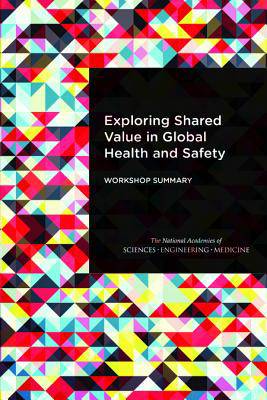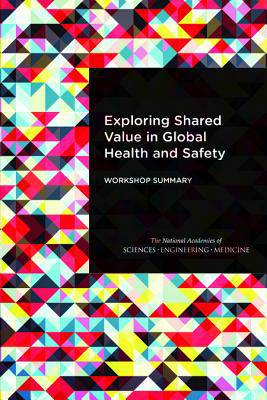
- Afhalen na 1 uur in een winkel met voorraad
- Gratis thuislevering in België vanaf € 30
- Ruim aanbod met 7 miljoen producten
- Afhalen na 1 uur in een winkel met voorraad
- Gratis thuislevering in België vanaf € 30
- Ruim aanbod met 7 miljoen producten
Exploring Shared Value in Global Health and Safety
Workshop Summary
National Academies of Sciences Engineering and Medicine, Health and Medicine Division, Board on Global Health, Forum on Public-Private Partnerships for Global Health and SafetyOmschrijving
Companies today are operating in a more complex and competitive environment where traditional models for doing business are no longer sufficient and expectations of business are growing both internally and externally. Many companies have long and robust histories of contributing to their communities as well as to more global societal needs, but this has been done primarily and historically through philanthropy and more traditional corporate social responsibility. However, companies are increasingly seeking greater alignment of these activities with their business interests in order to increase their value proposition. These same companies are also under increased pressure to build their business in a sustainable manner through innovative approaches.
The National Academies of Sciences, Engineering, and Medicine convened a workshop to explore the concept of shared value for global health and safety stakeholders in both the public and private sectors; roles, responsibilities, incentives, and opportunities for different stakeholders engaging in global health and safety initiatives in low- and middle-income countries; and the potential of partnerships and collaboration for improved outcomes for all stakeholders, including the communities they serve. Participants considered potential opportunities for creating shared value for all organizations, specifically the creation and impact of shared value through an organization's core products and services, through employee health and wellness programs, and through community or population health investments. This report summarizes the presentations and discussions from the workshop.
Specificaties
Betrokkenen
- Auteur(s):
- Uitgeverij:
Inhoud
- Aantal bladzijden:
- 156
- Taal:
- Engels
Eigenschappen
- Productcode (EAN):
- 9780309442503
- Verschijningsdatum:
- 26/10/2016
- Uitvoering:
- Paperback
- Formaat:
- Trade paperback (VS)
- Afmetingen:
- 150 mm x 226 mm
- Gewicht:
- 272 g

Alleen bij Standaard Boekhandel
Beoordelingen
We publiceren alleen reviews die voldoen aan de voorwaarden voor reviews. Bekijk onze voorwaarden voor reviews.











